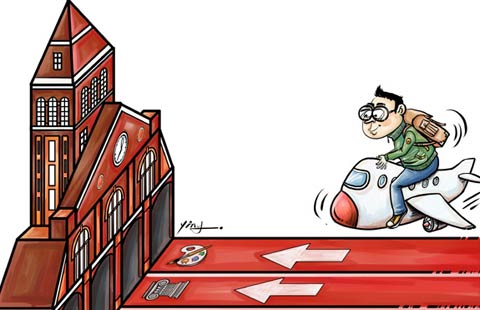Toy story shows quality and value can be successful
By Alexis Hooi and Qiu Quanlin (China Daily) Updated: 2011-08-19 08:16
|
 |
'It will take time'
Alberto Vettoretti, managing partner of the China and Vietnam practice at business advisory Dezan Shira & Associates in Shenzhen, says it won't be easy to move away from the perception of the delta as the hub of low-cost manufacturing.
"It has been doing extremely well in terms of growth and the low-end export economy. But now that the decision has been taken, with the Guangdong government quite clear in saying that it has to 'clean the cage to change the birds', what they want to do is very clear but it will take some time," he said.
As part of the country's five-year plan, central authorities plan to gradually increase the minimum wage by an average of more than 15 percent annually. In Guangzhou, the minimum wage has already been raised to 1,300 yuan a month.
Tony Chen, chairman of Shunde Uyork Furniture Co in Foshan's Shunde district, said, "Wage hikes are definitely a concern for us, together with higher cost of materials. But that also means we need to find new avenues for growth, particularly in a 'bricks-and-mortar' industry like ours."
Chen is a major player in Shunde, which has at least 2,000 businesses that help to make Guangdong responsible for one-third of the country's furniture market and half of its furniture exports. Uyork, which Chen started 14 years ago, employs more than 500 workers and rakes in about $20 million a year.
But the sector slowed in the first half of the year and there could be tough times ahead, he said. To stay on top of the game, he is ramping up ways to promote his brand at home and abroad. These include showrooms linking his brand to "a lifestyle and tapping into Chinese culture, such as the experience of drinking tea in a holistic setting", that go beyond mere tables and chairs.
The investment is also a long-term one that requires government support that balances the need for an open market and level playing field, he said. "That is still the best way to encourage innovation and fuel growth."
Improve, don't abandon
In Zengcheng, a suburb of Guangzhou known for its jeans industry, businesses large and small are also battling rising wages and production costs. More than 3,000 major producers there churn out about 200 million garments annually.
Conshing Group alone hires about 3,000 workers on its 32-hectare site and can produce more than 50,000 pairs of jeans a day. The company reaps about 300 million yuan a year from the domestic market.
But Landy Wu, the human resources and administration manager, said the company is also focusing on worker welfare and the environment as part of efforts to upgrade its business.
"We have increased investment in our water treatment facilities, for example, because of the huge amounts of water we use to wash our jeans," Wu said. "We need to think about how we can keep our business sustainable, beyond short-term economic gains."
Chen Guanghan, an economics professor and delta specialist at Sun Yat-Sen University, said it is inevitable that the delta fully upgrade its industries but it could take about 20 years.
"It took us three decades to get here, so it will also be some time before we can change," he said. "But we should not totally dismantle or abandon the industries that our success is built on. The idea is to improve and innovate from these sectors. Some of the businesses are already doing this in the electronics and even furniture industries.
"The government must be very careful in directing the change. It should just provide the framework and necessary support. It is still best to let the businesses and the market make the changes and the upgrade."
- Seven villagers murdered in N China
- China steps up tobacco control efforts
- Five jailed for separatism in Xinjiang
- Letter asks for leniency in poisoning case
- Antibiotics in surface water pose 'indirect health risk'
- Tianjin airport opens up transit link to Beijing
- High levels of antibiotics in China's major rivers
- China to dig tunnel for Asian rail system
- Bering strait line to US possible, experts say
- China: Stop oil rig harassment







